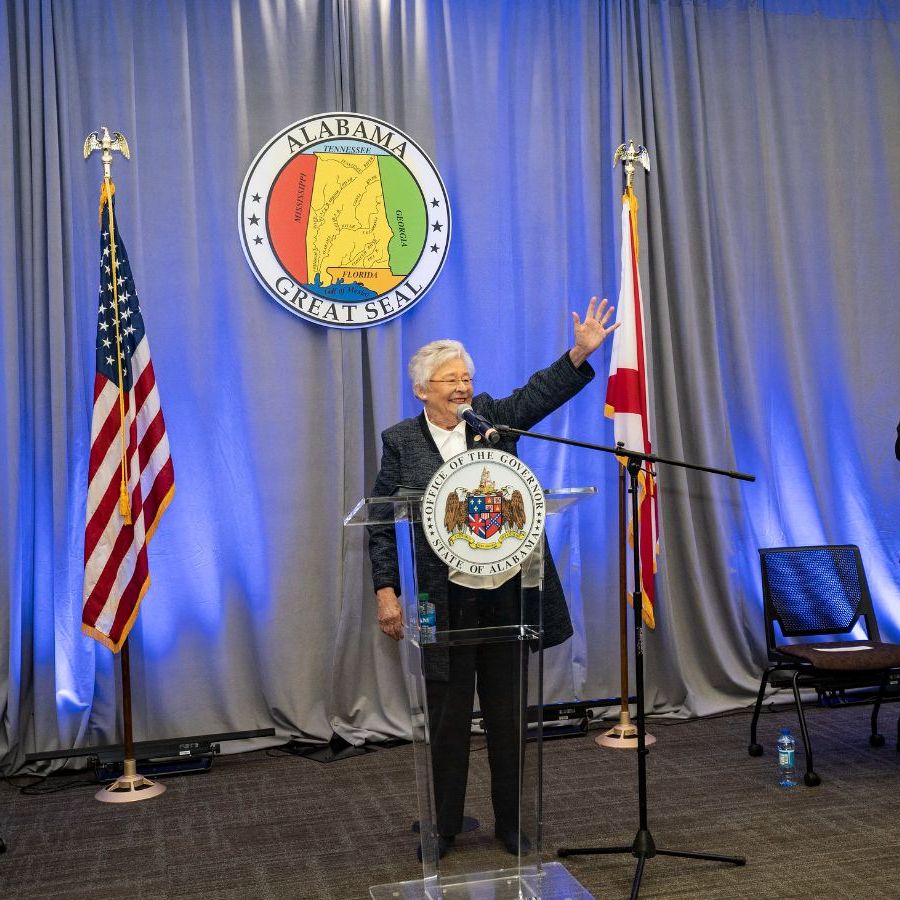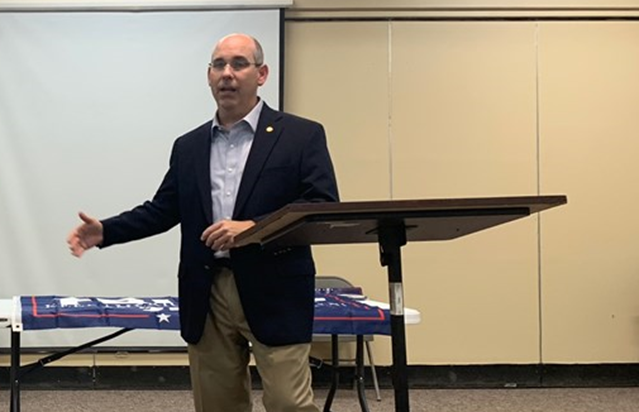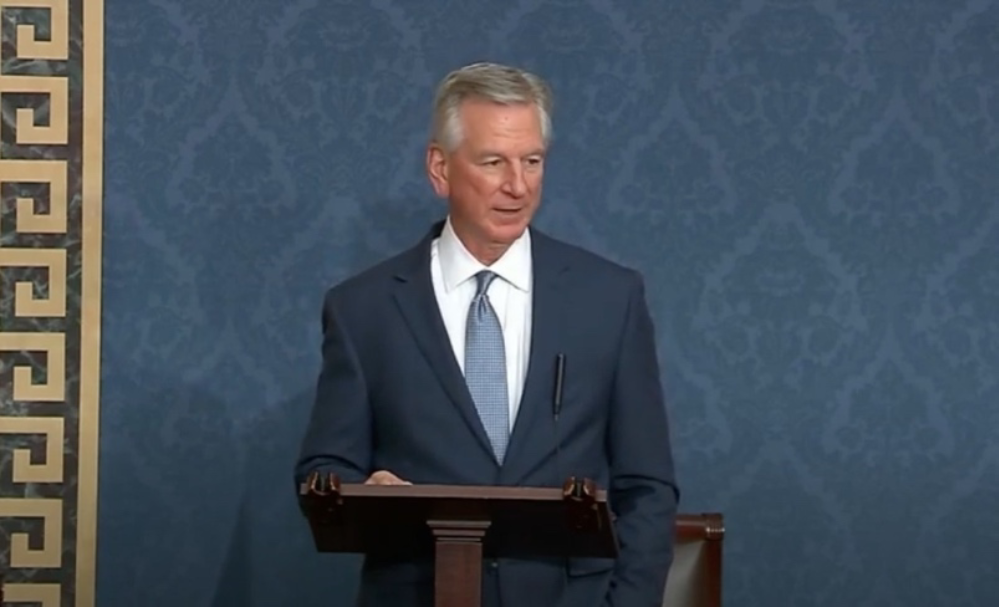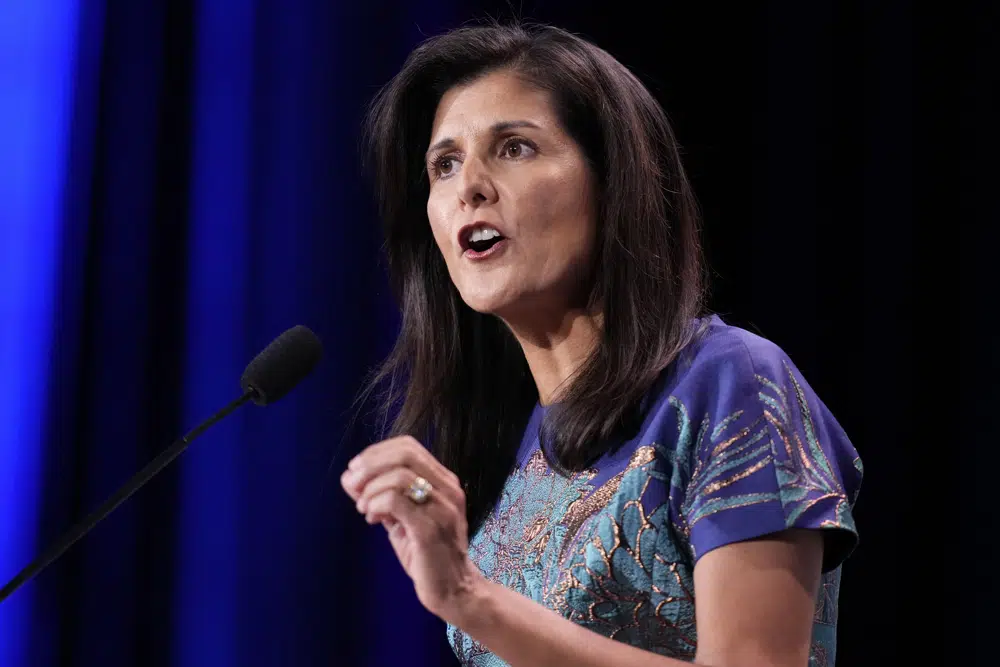Several groups oppose tax increase in Tuscaloosa County

Voters today are going to the polls in Tuscaloosa County to decide whether or not to pass a ten-mill property tax increase to benefit the Tuscaloosa County School System. It is usually only small-government conservatives who oppose tax increases to benefit schools, but this referendum has been very different. A broad coalition of opponents from across the political spectrum are urging Tuscaloosa County voters to vote “no” on this tax increase. The single-issue ballot measure, on Valentine’s Day, includes one five-mill tax increase and a three-mill tax increase. Some tax increase opponents have suggested that the decision to schedule this referendum on Valentine’s Day was intentional as an attempt to decrease voter turnout. The Tuscaloosa Farmers Federation opposes the tax increase and has funded “Vote No” signs that have appeared across the county. Farmers and timberland owners have a large portion of their net wealth tied up in land, so massive tax increases disproportionately impacts them. Farmers, like homeowners, have to pay property taxes whether they make any money that year or not. Former Northport Mayor Bobby Herndon is asking voters to vote No on the tax increase; because he feels that Northport would be better served by forming its own city school system and that this tax increase will not do enough to benefit Northport families. “I’m very passionate about Northport city schools,” Herndon said. “But as a Dad, a Granddad, a citizen of the great city of Northport, Northport’s never going to be the city it can be until it has its own school system.” The Tuscaloosa NAACP is also calling for voters to vote No on the tax increase proposal over concerns above allegations of racism and censorship of Black history during Black History Month. Lisa Young is the President of the Tuscaloosa Chapter of the NAACP. Young said that the NAACP believes the allegations that the students have made and are asking Tuscaloosa County voters to vote no. “One of the requests of the students is that citizens in the county not support the tax referendum scheduled for tomorrow’s vote,” Young said Monday. “We are asking people to su[pport these students by going to the polls tomorrow and voting no. While we want quality education for all students in Alabama, we cannot trust that the funds received would be used to benefit all students equally.” Superintendent Keri Johnson said that the tax increase will generate $150 million for the system over the next ten years. The tax increase will apply to vehicle tags as well as homes, businesses, farms, and lands. Johnson said that passing both tax increase measures on the ballot will fund a number of capital improvements as well as allow the system to reduce class sizes, improve mental health services for students, allow the system to offer dual enrollment scholarships, hire more school resource officers, and improve security. This does not apply to persons whose children as zoned to Tuscaloosa City schools, as the City of Tuscaloosa has its own school system. Residents of Tuscaloosa city pay 21 mills in property taxes. Tuscaloosa County residents currently pay 10 mills – the minimum that the state will allow. Polls will stay open until 7:00 p.m. To connect with the author of this story, or to comment, email brandonmreporter@gmail.com.
Auto supplier Samkee Corp to build first U.S. manufacturing plant in Tuskegee

On Friday, Alabama Governor Kay Ivey announced that Samkee Corp., a major South Korean automotive supplier, plans to invest $128 million to open its first U.S. factory in Alabama through a project that will create 170 jobs in Tuskegee and provide an economic boost for Macon County. “Alabama’s auto industry is filled with world-class manufacturing companies from around the world, and Samkee will fit right in with that group,” said Gov. Ivey. “We’re proud that the company selected Alabama for its first U.S. production center and look forward to seeing it grow and thrive in the coming years.” After finalizing agreements with state and local authorities, Samkee Corp. is poised to begin construction on the new manufacturing facility in the Tuskegee Commerce Park. It will become the city’s first auto parts manufacturer. Samkee will serve as a Tier 1 supplier to Hyundai Motor Co. According to the Alabama Department of Commerce, the new jobs will pay an average wage of just over $20 an hour. Samkee was founded in 1978. The company specializes in high-pressure die-cast aluminum components, including parts for engines, transmissions, and electric vehicles, along with alloys. The company currently operates factories in South Korea and China. Hyundai has a major automobile manufacturing presence in Montgomery. Chi Hwan Kim is the CEO of Samkee. “Samkee is a worldwide leader in quality manufactured aluminum die-cast products,” Kim said. “Our Tuskegee plant will allow our company to serve the North American market along with Hyundai’s market growth for both combustion engines and transmissions, as well as electric vehicle and battery parts.” Kim thanked Gov. Ivey for her assistance. “I give many thanks to Governor Ivey, Secretary Canfield and local officials, and Hyundai Motor for their steadfast support to Samkee in our decision today,” Kim added. Greg Canfield, Secretary of the Alabama Department of Commerce, said that Samkee’s decision to locate its first North American factory in Macon County reflects its confidence in the region’s workforce. “The skilled workers in Alabama’s auto sector have proved they are ready for any challenge the industry can throw at them, and they consistently turn out complex products of the highest quality,” said Secretary Canfield. “Samkee has come to the right place for its new U.S. industrial home.” Joe Turnham, director of the Macon County Economic Development Authority, said that local support for the project includes site work in Tuskegee Commerce Park, upgrades to the water and sewer system, and the installation of a new power substation. “Samkee appreciated the local assets, spirit of cooperation, and friendship developed over time with Macon County,” said Turnham. “We have strived with our stakeholders in a team effort to meet Samkee’s needs. We will remain partners going forward to see that they have a successful construction and manufacturing launch and future growth in the North American market. This is obviously a big win for our community and its citizens.” Tuskegee Mayor, Tony Haygood, said, “Today’s announcement is another major step in Tuskegee’s progression as a city. Samkee will be a great community partner for years to come and an example of how Tuskegee is open for business in the 21st Century marketplace. We appreciate Samkee’s partnership with us and will strive to succeed and grow together.” New automobiles and automotive parts are Alabama’s largest export. The state exported $8.9 billion worth of Alabama-made vehicles and parts last year, which approached $8.9 billion last year, an increase of 13%. Billions more are sold in Alabama and all fifty states. Alabama Industrial Development Training (AIDT), the state’s primary workforce development agency, will help Samkee assemble and train its workforce. According to an analysis by the Center for Business and Economic Research (CBER) at the University of Alabama, the Samkee factory will generate $140.2 million in annual economic output in Macon County, will add $37 million to the county’s GDP, and generating $1.3 million per year in taxes for Macon County. Production is expected to begin at the Tuskegee plant sometime next year. To connect with the author of this story or to comment, email brandonmreporter@gmail.com.
Clyde Chambliss pre-files bills aimed at improving Alabama’s election integrity

State Senator Clyde Chambliss has pre-filed two bills ahead of the 2023 Alabama regular session, which he claims will improve the integrity of future Alabama elections. The Alabama legislature will return for the regular session on March 7. Both pieces of legislation seek to place existing administrative rules into statute, meaning that the election regulations could not be changed without legislative approval. There would be no discernible changes in how Alabama voters of poll workers. Instead, these two bills would simply codify the rules that are already in place. Senate Bill 9 (SB9) would require that the state’s electronic voting counting system must require the use of a paper ballot that is marked and inspected by the voter prior to being cast and counted. “All Alabama elections currently use paper ballots,” Chambliss explained. “This bill would codify the current process to ensure that Alabama’s voters will always use paper ballots and that they will always mark those ballots in order to cast a vote in any election held in this state. This bill protects the process that we have in place now.” The second bill, SB 10, prohibits the use of electronic vote counting systems that are capable of connecting to the Internet or cell phone networks or that possess modem technology. “It is essential that voters have faith in the integrity of our elections process,” Chambliss said. “This bill would ensure that no voter ever has to be concerned about the internet connectivity of voting machines. By banning any form of connective technology in our vote counting machines, we are ensuring that our elections remain free of any technological interference.” Chambliss noted that the state of Alabama is widely recognized as having the most secure elections in the country. He said that he is committed to keeping elections as safe and secure as possible. “Every voter in every election in this state – municipal, county or state – should leave the polling place with the assurance that every vote is counted fairly and securely. These bills do just that,” he said. The disputed results of the 2020 Presidential election and controversial election year changes in election processes in swing states like Georgia, Arizona, Pennsylvania, Nevada, and Wisconsin have led many conservatives to question election integrity across the country. Alabama already has some of the tightest voter laws in the nation. Every voter is required to present a valid photo ID at the polls. There is no early voting, no electronic voting, no curbside voting, no internet voting, no same-day registration, and every voter must vote only at the polling place to which they are assigned. Alabama allows absentee voting, but only with a valid excuse, and absentee ballots must be witnessed. Chambliss serves as the Alabama Senate’s Majority Whip. He is currently serving his third term in the State Senate representing District 30, which covers Autauga, Elmore, Chilton, Coosa, and Tallapoosa counties. Republicans hold a 27 to 8 supermajority in the Alabama Senate. To connect with the author of this story, or to comment, email brandonmreporter@gmail.com.
Tommy Tuberville calls for protecting Camp Lejeune victims from “predatory trial-lawyers’ scams”

U.S. Senator Tommy Tuberville has joined Sen. Dan Sullivan in reintroducing the Protect Camp Lejeune Victims Ensnared by Trial-lawyers’ Scams (VETS) Act to cap the fees trial lawyers can charge in cases representing Marines and other individuals impacted by water contamination at Marine Corps Base Camp Lejeune in North Carolina. Tuberville said that the fees that predatory attorneys charge could, in some cases, be as high as 60 percent, leaving little compensation for the victims. “Veterans should be viewed as heroes, but sadly, predatory lawyers see them as a way to line their pockets,” said Sen. Tuberville. “America’s veterans have sacrificed too much for us to sit back and allow them to be taken advantage of by bad actors of any kind. As issues within the PACT Act continue to surface, we will fight to correct them and ensure our veterans don’t suffer because of vaguely-written legislation.” “In my eight years in the U.S. Senate, there are few issues I’ve been involved with that more desperately cry out for a just resolution,” said Sen. Sullivan. “Worst of all, the Biden Justice Department warned the Congress that, without a cap, predatory law firms could grab the lion’s share of these judgments and leave Marines and their family members with crumbs. This is an outrage—all Americans know it, all senators know it. My Republican colleagues and I have tried to remedy the situation multiple times, but some Democrats worked to block those efforts. It’s outrageous. With the bicameral legislation we are introducing, our colleagues will once again have an opportunity to protect these courageous service members who’ve served and sacrificed to protect all of us. The time to act is now. Let’s all have a little courage, like the Marines who need our help, and pass this important legislative fix.” The legislation has also been introduced in the House of Representatives. “While measures have been taken on behalf of veterans affected by the water crisis at Camp Lejeune, it has also opened the door for unscrupulous attorneys to prey on desperate victims and engage in rampant lawsuit abuse,” said Rep. Darrell Issa. “If not prevented, millions of dollars could go to predatory law firms rather than deserving service members and their loved ones. That’s why I’m thankful for the leadership of Rep. Bost and Sen. Sullivan and proud to join my colleagues in both houses of Congress to advance this crucial legislative solution. It’s time to put Marines and their families first.” Congress passed the Camp Lejeune Justice Act within the Honoring our Promise to Address Comprehensive Toxins (PACT) Act allowed Camp Lejeune victims to seek compensation. But like many pieces of legislation, there were unforeseen consequences. In this case, the hastily-written legislation did not set fee caps for attorneys in these cases, allowing unscrupulous attorneys to exploit sick veterans by charging exorbitant fees for their services. The U.S. Department of Justice (DOJ) warned of the implications should these parameters not be in place, but these warnings were ignored by Congress in its rush to pass legislation to help vets. In many cases, underground storage tanks for things like fuel, over time, can degrade. In 1982, the U.S. Marine Corps discovered dangerous chemicals known as volatile organic compounds (VOCs) in the drinking water at the Camp Lejeune base in North Carolina. These include benzene, tetrachloroethylene (also known as perchloroethylene or PCE), trichloroethylene (TCE), and vinyl chloride (VC). Some of these substances are known carcinogens. The most contaminated wells were shut down in 1985, but the problems persisted past 1987 and may date as far back as 1953. Now many elderly Marines and their dependents believe that their current healthcare issues could be related to their time at Camp Lejeune. Congress has acknowledged that Marines and other individuals were adversely impacted by water contamination at Marine Corps Base Camp Lejeune in North Carolina. Affected individuals are able to seek compensation as a result of the Camp Lejeune Justice Act. According to the latest information provided by the United States Navy, there are currently 20,000 cases filed so far, with the claims averaging around $10 million. Last November, Sen. Tuberville joined nine U.S. Senate colleagues in calling the Protect Camp Lejeune Victims Ensnared by Trial-lawyers’ Scams (VETS) Act for a vote on the Senate floor, but Senate Democrats blocked the effort. Tuberville is a member of the Senate Veterans Affairs Committee. He has already had two pieces of veterans legislation recently signed into law to help veterans. To connect with the author of this story or to comment, email brandonmreporter@gmail.com.
Nikki Haley faces ‘high-wire act’ in 2024 bid against Donald Trump

Few have navigated the turbulent politics of the Trump era like Nikki Haley. In early 2016, the then-South Carolina governor said she was “embarrassed” by candidate Donald Trump and decried his reluctance to condemn white supremacists. Nine months later, she agreed to join his Cabinet, serving as a key validator as Trump sought to win over skeptical world leaders and voters at home. And shortly after Trump left the White House, Haley, whose resume by then included an ambassadorship to the United Nations, vowed not to step in the way if he ran for the 2024 Republican presidential nomination. Yet on Wednesday, she is poised to become the first major Republican candidate to enter the race against him. “It’s going to be quite the high-wire act,” said veteran Republican strategist Terry Sullivan. “She says she’s always been an underdog. She will be again.” The 51-year-old Haley may be the first to take on Trump, but a half-dozen or more high-profile Republicans are expected to join the GOP’s 2024 presidential nomination contest over the coming months. Some would-be competitors may be more popular than Haley, even in South Carolina, where she lives and has established a campaign headquarters. Likely rivals include Sen. Tim Scott, a fellow South Carolinian and perhaps the most celebrated elected official in a state where Trump has already locked up endorsements from the governor and its senior senator, Lindsey Graham. Florida Gov. Ron DeSantis and former Vice President Mike Pence could also be formidable foes should they run, as widely expected. Indeed, on the eve of this week’s announcement, there is broad agreement that Haley — the only Republican woman of color expected in the 2024 contest, a politician who loves to remind people that she has never lost an election — is about to be tested as never before. Trump, for instance, has already stepped up his attacks on Haley. But allies describe the former governor, who is the daughter of Indian immigrants, as a savvy executive uniquely positioned to lead a new generation of Republicans. They understand that the fight ahead could get ugly. “She took the bull by the horns and said, ‘That doesn’t matter to me, I’m going to run,’” said longtime supporter Gavin J. Smith. “She did that when she ran for governor, and that’s what you’re going to see when she runs for president.” Perhaps more than anyone this young presidential primary season, Haley personifies the Republican Party’s shifting views on Trump. Her reversal on whether to challenge the former president was based less on concerns about his divisive leadership or policy disagreements than the growing belief within the GOP that Trump is losing political strength. New York-based Republican donor Eric Levine says he’s convinced that another Trump Republican nomination would lead to his party’s destruction. Haley, he said, is among the three favorite Trump alternatives. “I think as a woman of color and a daughter of legal immigrants from India, she’d give the Democratic Party no reason to exist. All their woke crap goes out the window,” Levine said. “I think she’s a spectacular candidate.” Haley’s announcement will take place Wednesday in Charleston, the historic coastal city where her campaign will be based. Almost immediately, she’ll travel to meet voters in New Hampshire and Iowa. She’s entrusted her campaign to a collection of senior staff led by longtime aides. Betsy Ankney, who heads up Haley’s PAC, will manage the campaign, with the PAC’s development director, Mary Kate Johnson, as finance director, Haley’s team told The Associated Press. Longtime Haley adviser Chaney Denton and Nachama Soloveichik, who was a spokeswoman for recently retired Pennsylvania Sen. Pat Toomey, will head up communications. Strategist Jon Lerner will serve as senior adviser, and Barney Keller of Jamestown Associates will be Haley’s media consultant. For Haley, this week’s launch marks a significant step on a long road that began in South Carolina’s “Good Old Boys Club,” she wrote in a Friday fundraising appeal. “People thought I was too brown … too female … too young … too conservative … too principled,” she wrote. Born in 1972 in rural South Carolina, Haley has long spoken of a Southern rural childhood in which she felt she didn’t fit. She was raised in the Sikh faith with a mother who wore traditional saris and a father clad in a turban. “Nikki has been regularly underestimated,” said Catherine Templeton, a Republican who served Haley in two roles, leading South Carolina’s labor and public health agencies. “But it makes her work harder.” In her first campaign in 2004, Haley, formerly an accountant, defeated the longest-serving member of South Carolina’s House. After six years in the Legislature, she was considered a longshot when she mounted her 2010 gubernatorial campaign. The GOP field was filled with more experienced politicians, and at times, she faced blatant racism. Then-state Sen. Jake Knotts appeared on a talk show and used a racial slur in reference to Haley. He apologized, saying it was meant as a joke. Still, Haley became the first woman and person of color elected South Carolina’s governor — and the nation’s youngest state executive. After winning reelection in 2014, her second term was marred by crisis. She spent weeks attending funerals of Black parishioners gunned down by a self-avowed white supremacist at a Charleston church in 2015. Later that year, she pushed for and signed legislation to remove the Confederate flag from the Statehouse grounds, where it had flown for more than 50 years. Haley’s political skills were tested in a different way in 2016, as Trump went from late-night television punchline to serious Republican presidential contender. She endorsed Florida Sen. Marco Rubio ahead of South Carolina’s high-stakes Republican primary, then backed Texas Sen. Ted Cruz once Rubio was knocked out. Then, Haley described Trump as “everything a governor doesn’t want in a president.” She also said she was “embarrassed” by his attacks against former President George W. Bush and condemned Trump’s reluctance to disavow the KKK. But shortly after Trump won the presidency, she agreed to serve as the new administration’s ambassador to the United Nations, a Cabinet-level position.
Analysis shows that Alabama sales tax rates are fourth highest nationally

Alabama’s combined sales tax rate of 9.25% is the fourth highest nationally, according to a report by the nonpartisan Tax Foundation. Alabama’s sales tax rate trails only Louisiana (9.55% combined with a maximum local rate of 7%), Tennessee (9.55% combined with a maximum local rate of 2.75%), and Arkansas (9.46% combined rate with 6.125% as the maximum local rate). Three of the state’s five largest cities by population – Birmingham, Mobile, and Montgomery – have sales tax rates of 10%. In Mobile, for example, the county receives 1%, and the city levies a rate of 5% in addition to the statewide rate of 4%. Huntsville has a 9% sales tax rate, the lowest of the state’s major cities, a rate it shares with Tuscaloosa, Muscle Shoals, and Dothan. Of Alabama’s neighbors, all but Tennessee have lower combined sales tax rates, including Florida (7.02%), Mississippi (7.07%) and Georgia (7.4%). According to the report, California has the highest statewide rate at 7.25%, followed by Indiana, Mississippi, Rhode Island and Tennessee at 7%. The Tax Foundation says 45 states levy a sales tax, while 38 allow local governments to levy one as well. Five states – Alaska, Delaware, Montana, New Hampshire, and Oregon – do not levy state sales taxes, but Alaska allows local governments to institute them. One issue with sales taxes, according to the Tax Foundation, is competition between states and local governments. The group advises policymakers to be cautious about increasing rates much higher than neighboring states and communities because that can lead to tax revenues not meeting expectations or even a revenue loss. For example, several suburban communities in Alabama have lower taxes than the major city. Both Prattville (Montgomery) and Daphne (Mobile) have combined tax rates of 9.5%, 0.5% lower than the major cities. Republished with the permission of The Center Square.
Florida doctors’ board tightens ban on gender-affirming care

A prohibition against puberty-blocking hormones and gender-affirming surgeries for minors in Florida was tightened further after a board overseeing doctors eliminated an exception for clinical trials Friday at the request of Florida Gov. Ron DeSantis’ administration. Some members of the public attending the meeting in Tallahassee shouted expletives, and law enforcement officers positioned themselves in the front of the room after the vote by the Florida Board of Osteopathic Medicine. The decision came after one member of the public after another testified at the packed meeting of the osteopathic medicine board and the Florida Board of Medicine that gender-affirming treatment had been ”magical” and like “opening a prison door” for them or their children. One transgender adult man, during his testimony, gave himself an injection of hormones in front of the doctors’ boards. Others said treatment had stopped them from “fighting with themselves” and contemplating suicide. “I’m a teenager. Without getting this medicine at this crucial age, I would have been waiting for my life to start,” said L.J. Valenzuela, a trans man in high school who said he was getting hormone replacement treatment. Judy Schmidt told board members that she worried that her trans son, who was 6 when he told her he was a boy, will have been transitioning socially for four to five years before he reaches puberty and won’t be able to get the gender-affirming care he needs. “You, as doctors, are supposed to do no harm,” Schmidt to the boards made up primarily by doctors. “If you make this blanket rule, you are doing harm.” The Florida Board of Medicine and the Florida Board of Osteopathic Medicine approved rules last fall that prohibited gender-affirming surgery and puberty-blocking hormones for minors, though minors receiving puberty blockers prior to the rules taking effect could continue to take them. The osteopathic medicine board made an exception for clinical research trials that examined the long-term impact of the treatments. During Friday’s meeting, the Florida Department of Health asked the boards to tweak the rules to eliminate the osteopathic medicine board’s exception for research. The DeSantis administration’s health department got the ball rolling on curbing gender-affirming treatment for minors in Florida last year by petitioning the boards to pass the prohibition. In 2021, DeSantis, who is widely considered to be weighing a run for the Republican presidential nomination, signed a bill barring transgender girls and women from playing on public school teams intended for student-athletes assigned female at birth. John Wilson, general counsel for the Department of Health, told the boards that the exception would create confusion since one board allowed it, but the other didn’t. “The department is concerned the exception undermines the purpose of this rule,” Wilson said. State Rep. Anna Eskamani, a Democrat from Orlando, called the prohibition against gender-affirming care “politically motivated.” “We should not be making policy based on who can make a fundraising letter off it,” Eskamani said. Florida Board of Medicine member Hector Vila disputed that interpretation of the board’s actions. “This isn’t about trans- or homophobia,” said Vila, a doctor in Tampa. “This isn’t about politics.” Republished with the permission of the Associated Press.


